- Home
- Raymond E. Feist
Wrath of a Mad God Page 18
Wrath of a Mad God Read online
Page 18
The wily gambler weighed every piece of evidence that he could discern, either through direct observation or from what others had said, either to him or what he had overheard when they didn’t realize he was listening. He now came to an inescap-able conclusion: the Dasati could not be defeated by the armies of every nation on Midkemia and Kelewan combined. At best they could be delayed. And at worst, they would sweep aside all opposition as if they were fighting children with play weapons.
Nakor resolved that whatever Pug found out about the history of this world, whatever revelations were discovered when he found the leaders of the Bloodwitch Sisterhood, no matter what the true nature of Macros—and he had serious doubts he was as he seemed to be—whatever any of them discovered, there 1 5 5
raymond e. feist
was going to be but one solution to the coming crisis: the destruction of the Dark God.
As he considered this conclusion, Nakor weighed all the Dark One’s actions in the past and something began to emerge, a sense of the true purpose behind the apparent mindless killing and destruction. There was a plan at work, a pattern of things unfolding, and he was tantalized by almost understanding what it was.
The deeper into the palace they traveled the more certain Nakor was that something profoundly evil existed at the heart of this society. Their art—what there was of it—was nothing more than a twisted celebration of their dark faith. He had been struck that since entering the second realm he had seen nothing that resembled decoration or art, except on the Dasati themselves.
They had some expression of beauty—once you adjusted to their appearances, they were a very handsome race, he decided—but there were no paintings or tapestries hanging on walls, no variation in color in buildings or signs. Some of this he was convinced was due to their having a very different color sense than humans—they could see below red and beyond violet, like certain creatures in the first realm, and they could see heat, which made them lethally dangerous fighters at night.
But it wasn’t until they were inside the palace that Nakor saw anything like fine art, and here it was in the form of ghastly murals, showing murder, torture, execution, and slaughter in praise of the Dark God. If there was a narrative aspect to the murals, Nakor couldn’t discern it, but he did intuit that this particular section had to do with some grand conquest in ages past.
At several points along their march, as Nakor followed Martuch and Hirea, he saw what he took to be an aspect of the Dark God himself. He seemed to be shown as a shadowy presence, without features or costume. Given the vividness of the rest of the subjects in the mural, Nakor found this odd. The warriors were depicted with a stylized accuracy, heads larger than life, so as to show their ancient headgear, each with its unique style, since replaced by the badges worn on the chestplate. The swords were different, too, as were the battle flags and banners.
1 5 6
wrath of a mad god
The victims were shown piled like cordwood, after being sacrificed to His Darkness.
Other murals showed long lines of prisoners being marched toward a vast pit and cast down into it, more sacrifices for the Dark One. As they approached their destination, Nakor saw the themes of the murals turning to a more martial focus, the themes being repeated of powerful warriors in service to the Dark One, led by the TeKarana and his Karanas in triumph over a variety of alien species.
There was nothing merely triumphant in this, thought Nakor. He had visited many worlds since meeting Pug, and nearly every civilization on Midkemia, and had encountered other martial societies, even those bellicose by nature, but nowhere did he see suffering and pain celebrated as he did here. It was as Kaspar had related to them when discussing his vision at the Pavilion of the Gods, when first shown the Dasati by Kalkin, also known as Ban-ath, the God of Thieves. These people thought pain was amusing, and suffering funny. Never, from his perspective, had Nakor encountered a more twisted view of life and death.
No, he amended to himself as they reached their destination. There was a common theme. All life was suffering leading to death, and the only question was whether you were to suffer or to cause suffering. Then at the doorway that led into the Hall of Warriors, he saw one anomalous image. A Lesser, dressed as a healer, down in one corner, offering a cup of water to a suffering victim. It was odd, almost an afterthought, yet somehow significant, thought the little gambler.
As he hurried not to fall behind, one other detail caught his eye. A tiny glyph below the figure of the Lesser, almost un-noticeable if one was not examining the tableau carefully, and for a moment it made him almost stop in his tracks. It was a symbol that by any rational measure should not have existed in this universe, let alone be adorning this wall. Nakor pushed aside his astonishment, realizing that any break from the character of his adopted role could quickly end his life.
The hall they entered was large and functional, without a single decoration on any wall. Massive grey-black stones scintil-1 5 7
raymond e. feist
lated with the energies that had grown almost commonplace to Nakor, though he still had trouble finding the words to describe what he was seeing. A series of benches were arrayed in rows across the floor and a dozen young men sat waiting to be called.
Around them were warriors, fathers, teachers, brothers-in-arms, all bidding their young warriors good fortune and urging them to bring honor to the houses and societies that had spawned them. There was nothing Nakor would call regret on any face, but rather uniform pride in one of their own being selected to serve the TeKarana.
Bek sat alone on a bench near the far wall, isolated enough that a short conversation would not be overheard. Nakor glanced around the room and noticed that a few of the young warriors recruited to the TeKarana’s service were attended by Lessers.
“They can take a servant?” asked Nakor.
Hirea said, “Yes, but you can’t be thinking—”
“Yes,” interrupted Nakor. “I must.”
Further debate was interrupted by the arrival of a Deathpriest, escorted by two palace guards. He said, “I recognize the badges of the Scourge and Sadharin.” He looked down at Bek and said, “You wear no badge. Which society do you belong to?”
Before Bek could answer, Martuch said, “He is my retainer, by name Bek.”
“Sadharin. Which house?”
Now they were rapidly getting into murky water, for it was never considered for a moment that any of the visiting humans would undergo this level of scrutiny. Martuch said, “Langorin.”
The Deathpriest’s eyebrows rose slightly. “Your name?”
“Martuch,” he replied, inclining his head in a deferential gesture that was so slight it bordered on insolence.
“You are known, even here, Martuch of the Langorin. Is this your son?”
“No,” Martuch answered quickly. “He is from a Lesser family.”
Nakor wondered if this might be a ploy by Martuch to get Bek dismissed.
The Priest looked confused, both curious and dubious.
“How is this possible?”
1 5 8
wrath of a mad god
Martuch looked at Bek in such a way he was clearly telling the young man to pay close attention to the story. Nakor knew that Bek at times seemed single-minded, even to the point of simplicity, but he was anything but stupid. He was murderous and bloodthirsty and he took pleasure in others’ suffering, but he was no fool. A quick glance from Bek told the diminutive gambler that Bek would follow Martuch’s lead. “I found him during a hunt. He had been chased down by one of my youngest retainers, the son of one of my most trusted old companions, and Bek had pulled him from the saddle, taken away his sword and killed him.”
“Impressive,” said the Deathpriest, his expression changing.
“Not by half; by the time I reached the struggle, he had killed another Deathknight with his newly acquired sword and had wounded another grievously. He stood defiant, not a hint of fear, daring me and others to come and die. I knew at that mom
ent I needed to take him into my service, to train him for some special role. Now I understand why I was fated that day to take him in; the Dark One has marked him for a higher calling.”
“Apparently,” said the Deathpriest. He made an impercep-tible motion with one hand and the guard closest to Bek moved.
His hand shot down to the hilt of his sword and in a single motion he drew it, and with a looping arc, aimed it for Bek’s neck.
But before the blade had cleared the scabbard, Bek had moved just enough to his right to draw his own sword, reach back and drive it home. While the palace guard’s blow cut through empty air, Bek drove his own blade through the man’s stomach, punching through his armor and completely through his body, so that the point protruded from his back.
Martuch and Hirea stepped back to draw their own swords while Nakor moved away, ignored for the moment, but ready to defend himself and Bek with whatever “tricks” might be needed.
But to everyone’s surprise, the Deathpriest shouted,
“Hold!” The second palace guard stood ready to attack, but held his place.
Bek grinned at the Deathpriest. “A test?”
“Impressive,” repeated the Deathpriest. He looked at Mar-1 5 9
raymond e. feist
tuch. “You would not be the first head of a family to embellish the accomplishments of a called warrior, to gain reflected glory for your house and society. I found it hardly credible, the story you told, but now . . .” He glanced to where Bek easily pulled his blade free of the man’s corpse and added, “I believe this young man, with a sword he had never wielded before that night, killed two—”
“Three,” interrupted Martuch. “The wounded warrior died a short time after.”
“Three of your Deathknights.” He turned to Bek. “Stand up.”
Bek did so, and if he had been impressive sitting on the bench, he was now doubly so, for if anything his Dasati guise had made him even larger and more menacing than he was in human form. Martuch said, “It was a more than fair bargain. He is the equal of a dozen men.”
“This one will rise quickly, I think,” said the Deathpriest.
He glanced at Nakor. “Is this Bek’s Attender?”
“Yes,” said Martuch. “I gave this thing to him some time ago.”
“Come with me,” said the Deathpriest to Bek, and Nakor followed the young man.
Silently, Nakor sent up a short prayer to whatever kind god might just happen to listen. He took one moment to give Martuch and Hirea a quick glance over his shoulder, then followed his strange young companion into the heart of evil.
Pug was nearly exhausted by the time they landed. One unanticipated consequence of their chosen method of travel had been a particularly vicious flying predator that had a keener perception than most. An almost disastrous attack several hundred feet above the surface of another canton of the city had nearly caused him to lose control, which would have killed them all, less than an hour into their journey. He and Macros together destroyed the flock of winged killers, while Magnus kept them from falling to their death below.
Since that first encounter, Pug had had to fine-tune his spell of invisibility to cover a range of the spectrum beyond that which the Dasati eye could see, as well as somehow defeat those 1 6 0
wrath of a mad god
creatures that hunted by heat. He had used his prodigious ability to fashion such a mystical masking, literally on the fly, but the cost had been one of near-exhaustion by the time they reached their final destination.
Valko had endured the journey with a stoicism that would have shamed a Tsurani, Pug thought. If a young Dasati warrior could be termed “likable,” then Valko was such. He only mentioned his almost uncontrollable desire to murder them twice, but the context was how difficult he judged his personal struggle with new concepts and leaving old values behind, which was as close as any Dasati came to being personally revealing, Pug decided. In a very alien way, it was admirable.
They reached a mountain stronghold that was invisible to all but the most powerful scrying magic, but Pug had no difficulty sensing it as they approached. Perhaps it was a result of the manipulation he had been controlling for almost a full day as they jumped halfway around the world. Macros let out an audible sigh of relief when they touched the ground, and said, “I had none of your burdens, Pug, but I fear my constitution is far less robust than what it once was.”
“Is there any danger in approaching this enclave?” asked Magnus, who seemed relatively fresh despite his efforts over the last day and more. Pug was impressed by his son’s endurance.
“Most certainly,” said Macros. “We would do well just to stand here and let them come to us.”
For nearly an hour they waited, then at last a ripple in the air around the invisible enclosure announced the arrival of a quartet of young women. Pug suspected they were either among the most puissant of the Bloodwitches, or those they could most afford to lose if Pug’s group proved hostile.
“You are unbidden here,” said the leader, a striking young Dasati woman who was tall by her race’s standards. She had a bearing that set her apart from the others, so Pug assumed she must be the leader here.
Valko spoke before anyone else. “I am Valko, Lord of the Camareen, son of Narueen.”
1 6 1
raymond e. feist
That name provoked a response, but before the women could respond, Macros said, “And I am the Gardener. We have much to discuss.”
The leader nodded. “Indeed. You must all come with us.”
She stared hard for a moment at Valko, then turned and walked away. The other three stepped to either side, clearly indicating that Pug and his companions were to follow the tall young Bloodwitch.
As they reached the edge of an apparently empty clearing, Pug felt the energy pulse of magic and suddenly a walled fortification appeared. He realized that they had stepped past the boundary of a massive illusion, one designed to fool any onlooker until they actually made contact with the boundary. He also suspected that there were nasty surprises for anyone who did if they were not expected by those inside.
The enclave was ancient, Pug instantly knew. It had that look of stones which had been set in place for hundreds, even thousands, of years, worn smooth and seamless by the cease-less caress of the wind and rain. Corners once sharp were now rounded, and a rut in the stone showed where countless feet had trodden from the gate to the entrance of the main building.
This was the first Dasati construction Pug had seen that was not part of some massive urban center. It was simply a keep. It looked similar in many respects to one that he might find in the mountains of the Kingdom of the Isles, a square stone building with a circular tower rising in the middle, commanding a view of the mountain passes below that would warn any lookout of an enemy approach hours in advance.
Inside Pug could feel the vibrancy, which suggested far more than just the bustle of women busily taking care of the day’s needs, and in the distance he could hear the unmistakable sound of children. And they were laughing! The tall woman turned and said, “You must wait here for a moment.” To Valko she said, “And you must remove your sword and give it to her.”
She pointed to another young Bloodwitch.
“Why?” asked the young Deathknight defiantly. His sword 1 6 2
wrath of a mad god
was hard-won and represented much of who he was and what he had endured.
“Because there are those here who wish you to be unarmed,”
answered Macros. “Please.”
“Please” was a word rarely used in Dasati culture, and one that usually meant a pleading for life. In this context, it was a simple request, yet a powerful one. Valko removed his belt and scabbard and handed them to the young woman.
The leader of the four Dasati women departed, leaving them alone with the three remaining escorts. The hall in which they found themselves was just what Pug would expect from a simple keep: it was a short hallway, intersecting another
with two doors, one at either end, presenting a blank wall to the main entrance. In ancient days, should the main entrance be forced, invaders would have had a short route to awaiting death. Glancing upward, Pug saw the murder gallery above, down from which would rain arrows, bolts, rocks, and boiling pitch or oil. At either end of the hallway, massive doors waited, no doubt equipped with huge bars and reinforced to withstand all but the sturdiest rams. Pug could only speculate, but he imagined this fortification had never been taken.
Unlike the other Dasati buildings in which he had been, this one had decorations hanging on the walls. Ancient banners from the look of them; possibly insignia from antiquity, emblems of houses or societies long vanished. Pug could not tell. One of them, however, looked vaguely familiar, and his eyes kept returning to it. It was simple, a red field with a white glyph in the middle. The shape of it was almost recognizable, a single vertical line, bending to the right at the top and looping down to almost close against the vertical. Below that point, a short single line crossed and below that another, longer one. Why did he think he recognized it?
Three women returned in the wake of the young woman who had greeted Pug and his companions. The three younger women who had waited with Pug’s group departed.
Pug studied the three newly arrived Bloodwitches. They were all older and gave off a strong sense of power. The eldest of them said, “Who is the Gardener?”
Macros stepped forward. “I am.”
1 6 3
raymond e. feist
The older Bloodwitch looked at him for a moment, then said, “No, you are not. But I know who you are.”
Macros said, “Then who am I?”
“You are something very different, and it may take a while to explain, but you have been expected.” She glanced at his three companions. “We did not expect them, however.” She pointed to Valko. “Especially not him.”
Pug said, “Lady, we have come a very long way.”
She was peering intently at him, and Pug knew that he was being regarded by more than simple eyesight, even the more powerful Dasati vision. There was magic at play. He watched her eyes widen. “Ah, yes. Now I see. Come, we will offer you comfort and refreshment, and we shall speak of many things.”

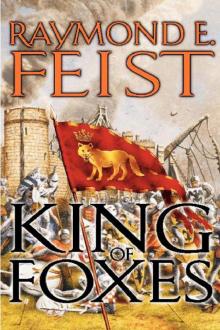 King of Foxes
King of Foxes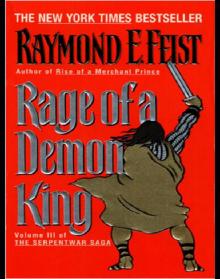 Rage of a Demon King
Rage of a Demon King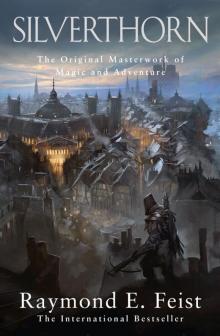 Silverthorn
Silverthorn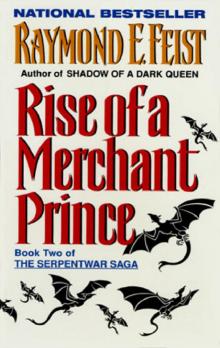 Rise of a Merchant Prince
Rise of a Merchant Prince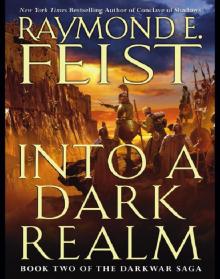 Into a Dark Realm: Book Two of the Darkwar Saga
Into a Dark Realm: Book Two of the Darkwar Saga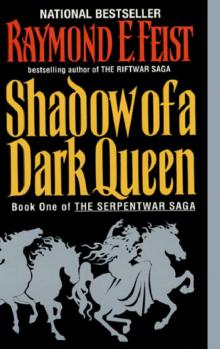 Shadow of a Dark Queen
Shadow of a Dark Queen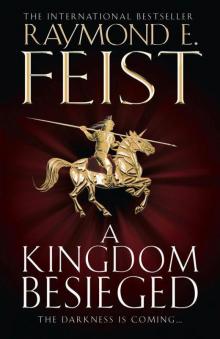 A Kingdom Besieged
A Kingdom Besieged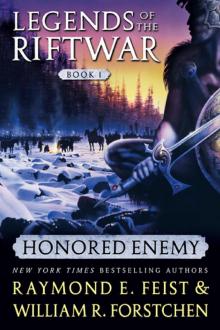 Honored Enemy
Honored Enemy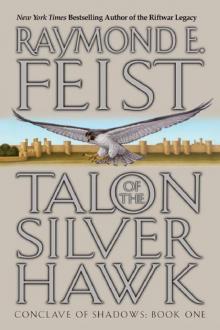 Talon of the Silver Hawk
Talon of the Silver Hawk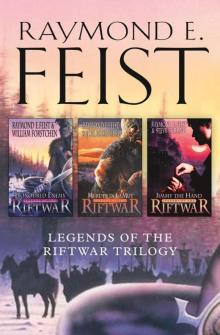 The Complete Legends of the Riftwar Trilogy
The Complete Legends of the Riftwar Trilogy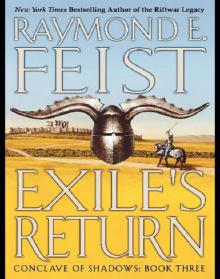 Exile's Return: Conclave of Shadows: Book Three
Exile's Return: Conclave of Shadows: Book Three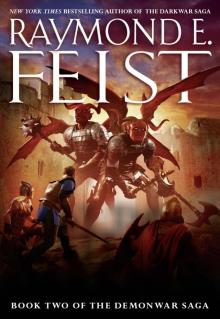 At the Gates of Darkness
At the Gates of Darkness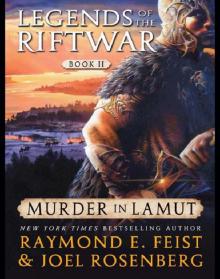 Murder in LaMut: Legends of the Riftwar: Book II
Murder in LaMut: Legends of the Riftwar: Book II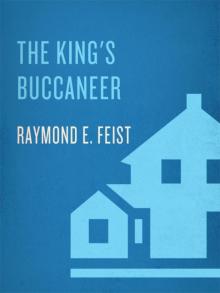 The King's Buccaneer
The King's Buccaneer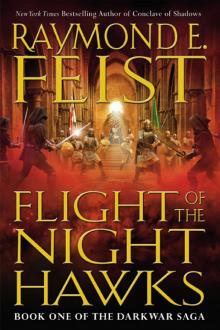 Flight of the Nighthawks
Flight of the Nighthawks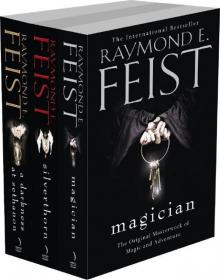 The Riftwar Saga
The Riftwar Saga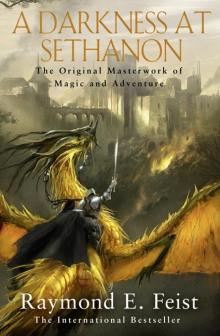 A Darkness at Sethanon
A Darkness at Sethanon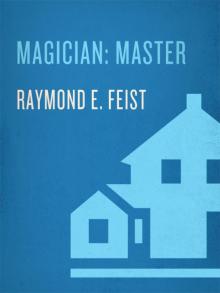 Magician: Master
Magician: Master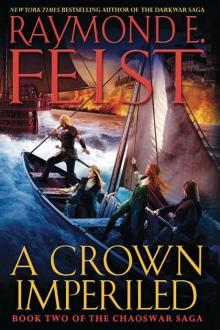 A Crown Imperiled
A Crown Imperiled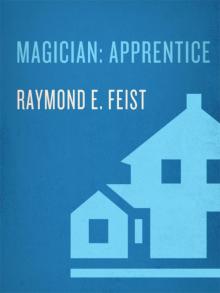 Magician: Apprentice
Magician: Apprentice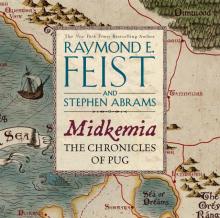 Midkemia
Midkemia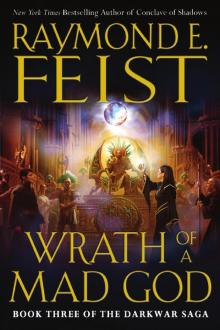 Wrath of a Mad God
Wrath of a Mad God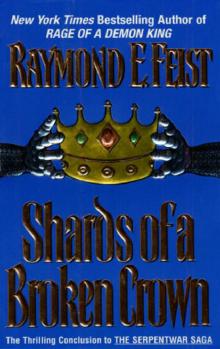 Shards of a Broken Crown
Shards of a Broken Crown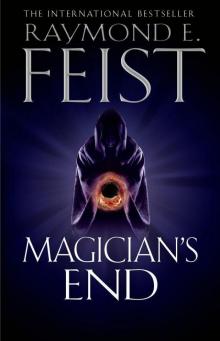 Magician's End
Magician's End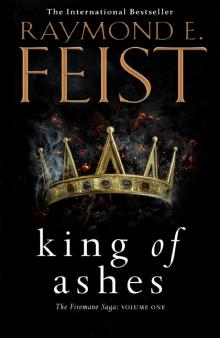 King of Ashes
King of Ashes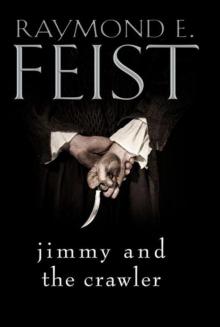 Jimmy and the Crawler
Jimmy and the Crawler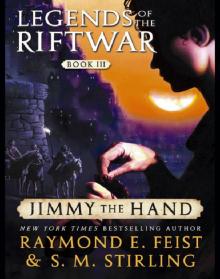 Jimmy the Hand: Legends of the Riftwar, Book 3
Jimmy the Hand: Legends of the Riftwar, Book 3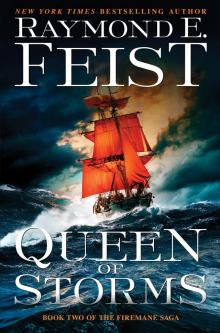 Queen of Storms
Queen of Storms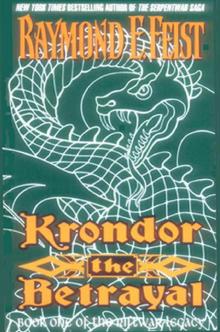 Krondor: The Betrayal
Krondor: The Betrayal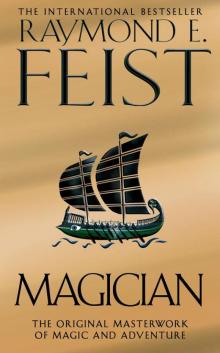 Magician
Magician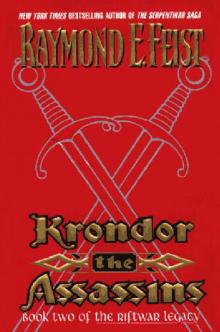 Krondor: The Assassins
Krondor: The Assassins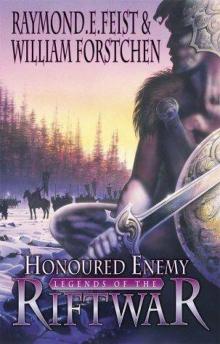 Honoured Enemy
Honoured Enemy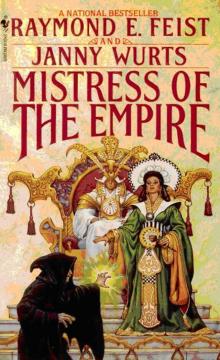 Mistress of the Empire
Mistress of the Empire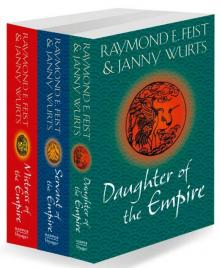 The Complete Empire Trilogy
The Complete Empire Trilogy Legends 1 - Honoured Enemy
Legends 1 - Honoured Enemy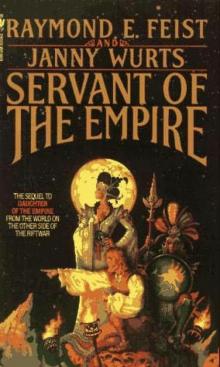 Empire - 02 - Servant Of The Empire
Empire - 02 - Servant Of The Empire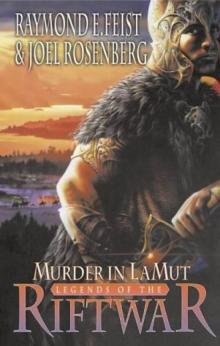 Murder In LaMut
Murder In LaMut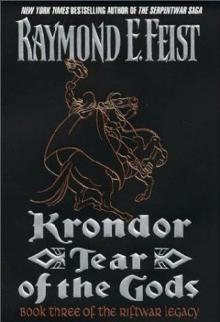 Krondor Tear of the Gods
Krondor Tear of the Gods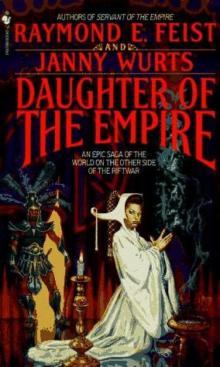 Empire - 01 - Daughter Of The Empire
Empire - 01 - Daughter Of The Empire![King of Ashes [Book One] Read online](http://i1.bookreadfree.com/i1/03/30/king_of_ashes_book_one_preview.jpg) King of Ashes [Book One]
King of Ashes [Book One]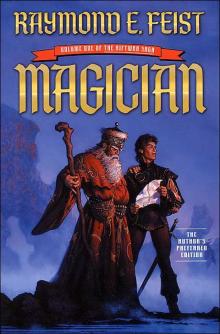 Magician (10th Aniversary Edition)
Magician (10th Aniversary Edition)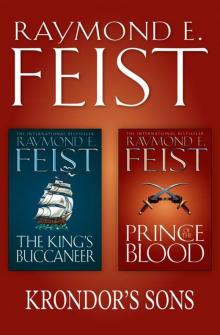 Prince of the Blood, the King's Buccaneer
Prince of the Blood, the King's Buccaneer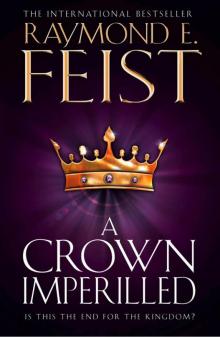 A Crown Imperilled cs-2
A Crown Imperilled cs-2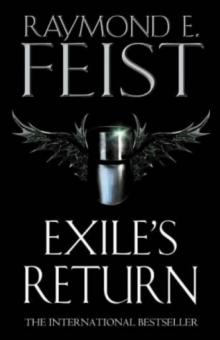 Exile's Return
Exile's Return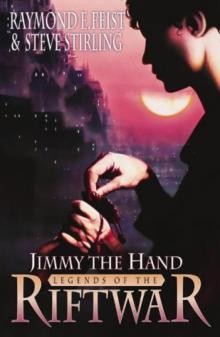 Jimmy the Hand
Jimmy the Hand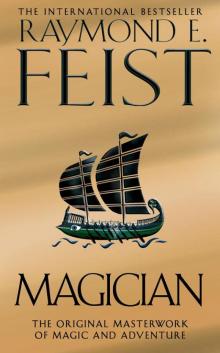 Book 1 - Magician
Book 1 - Magician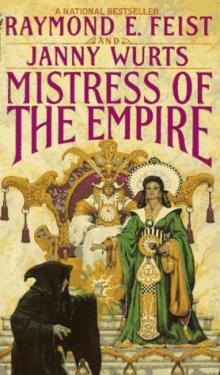 Empire - 03 - Mistress Of The Empire
Empire - 03 - Mistress Of The Empire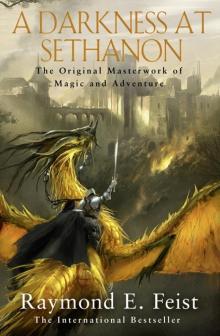 Darkness at Sethanon
Darkness at Sethanon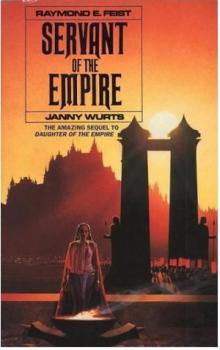 Servant of the Empire
Servant of the Empire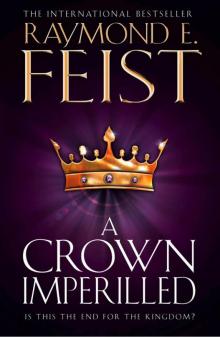 A Crown Imperilled
A Crown Imperilled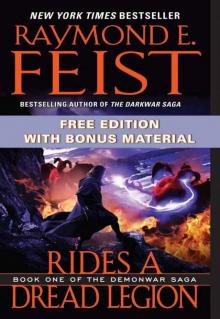 Rides a Dread Legion
Rides a Dread Legion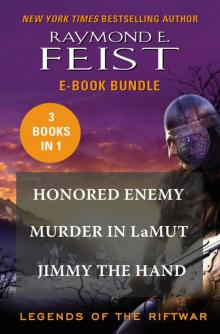 Legends of the Riftwar
Legends of the Riftwar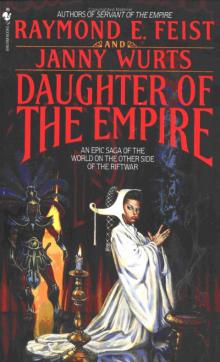 Daughter of the Empire
Daughter of the Empire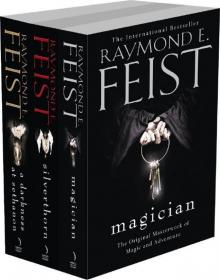 The Riftwar Saga Trilogy: Magician, Silverthorn and A Darkness at Sethanon
The Riftwar Saga Trilogy: Magician, Silverthorn and A Darkness at Sethanon